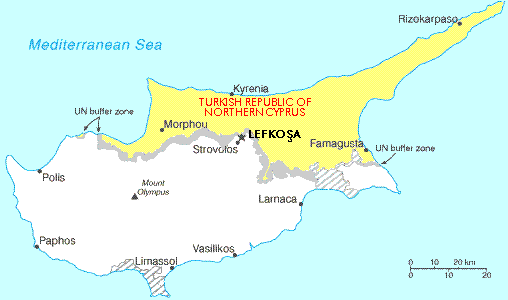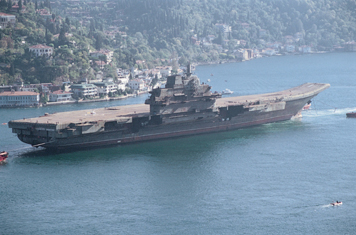A Turkish Gamble, a Chinese Venture
The Washington University Political Review is saddened to announce our difficult decision to euthanize the previous writer of the 360 column, Siddharth Krishnan, for grievous offenses against the Director of New Media and for high treason. He has been replaced with a new and improved Siddharth v2.0–please welcome Siddharth Ravishankar as the new 360 columnist. Hopefully he will survive long enough to enlighten you, the reader, with some insight into the international political stage.
The Gaza flotilla raid has captured the attentions of millions worldwide as Turkey has a war of words with an increasingly isolated Israel. This, combined with the escalating demands by the Palestinian Authority for increased representation within the United Nations has turned the world’s eyes away from the most important dispute in the eastern Mediterranean: Cyprus.
In 1974, the Cypriot island went through a military coup backed by the reigning junta in Greece. Turkey, claiming atrocities against ethnic Turkish Cypriots, occupied the northern half of the island. Greece, in the name of protecting ethnic Greek Cypriots, backed the government in the southern half of the island. Greece, a member of the European Union, has denied Turkey membership in the EU because of its history concerning Cyprus, and supports the Greek-backed Cypriot government’s claim to the entire island.

Recently, matters reached a new level when American and Israeli natural gas exploration firms discovered huge deposits of gas in the Leviathan Gas Field, named after the biblical monster of epic proportions, bordering the territorial waters of Israel and Lebanon. While there was a short scuffle over which nation has the right to extracting the gas, threats by Israel to use military force forced Lebanon to back off on its claims.
Spurred by one of the biggest natural gas discoveries of the new millennium, the same American company who discovered the Leviathan gas field (along with the earlier “Tamar” gas field) has initiated exploration operations in the territorial waters of Greek-backed southern Cyprus. The increase in Turkish rhetoric over the Gaza flotilla raid is correlated with increased tensions over gas drilling in Cyprus.
Over the past two weeks, escalations between Turkey and Israel have reached unprecedented heights, including the expulsion of Israeli Ambassadors from Turkey. This is combined with increased rhetoric by Turkish President Erdogan and Israeli Prime Minister Netanyahu touting the prowess of their respective navies.
This conflict over gas is part of a greater issue, one of Turkey’s increased prominence in the world. With Egypt, Iraq, and Libya under new leadership and Syria undergoing massive protests, Turkey is the one of the few standing Muslim countries in the Middle East with the power and demographics to take regional leadership. The first step to achieve this leadership would be to combat the current reigning power in the region, Israel. Perhaps if the European Union had accepted Turkey into their group in the recent past, Turkey would have been disinclined to seek their own path.
~~———————————————–~~
The People’s Republic of China has a long history of territorial disputes with its neighbors. The most famous of these is the question of Taiwan, the continuation of the Republic of China, which held out against Mao Zedong’s China. Equally well known is the conflict in Tibet where China asserted their claims of suzerainty over the Tibetan Plateau in the 1950s and took control of the feudal kingdom headed by the Dalai Lama.
Lesser known disputes by the People’s Republic include two long standing disputes with India over the Aksai Chin in Northern Kashmir, taken by China in the 1962 Sino-Indian War, and the Indian state of Arunanchal Pradesh, claimed by China as part of Tibet and thus, a part of the People’s Republic.
China also claims over Bhutanese territory, over the South Korean Ioeodo Island and also has a dispute with Japan over various islands near both nations.
In recent news, Chinese claims over island chains in the South China sea which are variously claimed or held by the Republic of China (Taiwan), the Philippines, Vietnam, Malaysia, and Brunei, have also been of prominence.
This longstanding conflict has been given new life by recent discovery of oil deposits in the disputed area. In an effort to counterbalance China’s increasing power, Vietnam has increased military ties with India, another regional power. The Vietnamese government also contracted an Indian company to start oil exploration in the disputed waters, only to face rebuke by China and official condemnation of this collaboration. In fact, a Communist Party-run newspaper called for the use of “every means possible” to stop Indian oil exploration and, a week ago, stated “The time to use force has arrived in the South China Sea; Let’s wage wars on the Philippines and Vietnam to prevent more wars.”

China’s actions have made its stance clear; the South China Sea, irrespective of international agreements that China has signed on to, is Chinese territory. On August 31st, China confronted an Indian Navy vessel in international waters just exiting a Vietnamese port, and asked the vessel to leave “Chinese waters.” The vessel was in international waters and in what is recognized to be the Vietnamese Economic Zone.
With Asian energy consumption to double within the next 20 years, China is seeking to secure the waterways into China and perhaps snag itself a source of crude oil. To make itself less reliant on the South China sea and the Straits of Malacca, China has begun construction of a Chinese port in Myanmar (Burma) to circumvent the voyage through Singapore and other contested waters.
The next few years in the South China Sea will be a portent of how far China will go to assert itself in the world stage.